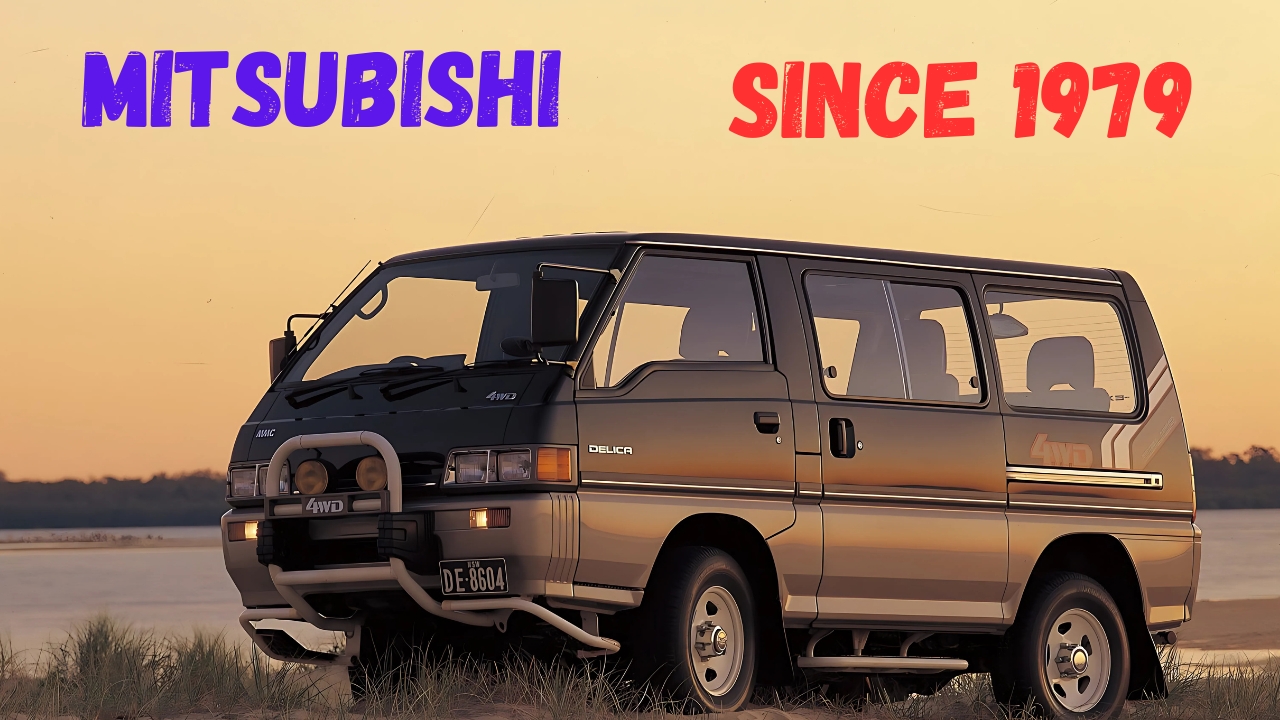Mitsubishi Van : Imagine walking into a car showroom today and finding a vehicle that first rolled off the production line when Jimmy Carter was president. Sounds impossible? Well, Mitsubishi is still producing Delica vans that first entered production all the way back in 1979, with no signs of stopping yet! This incredible story of automotive longevity proves that sometimes, the best designs truly are timeless.
A Van That Refuses to Retire
While most car manufacturers completely redesign their vehicles every five to seven years, the Mitsubishi Delica has been defying this trend for nearly half a century. The second-generation Delica first entered production in 1979 and amazingly, you can still buy essentially the same van today in several Asian markets.
This isn’t just about one stubborn manufacturer clinging to the past. The continued production of these vintage vans across multiple countries tells a compelling story about practical design, market needs, and the power of “if it ain’t broke, don’t fix it” philosophy.
Where Time Stands Still
The most fascinating part of this story isn’t just that these vans are still being made – it’s where they’re being made and why they remain relevant.
In Taiwan, Mitsubishi Motors Taiwan speaks to the long and successful run of the Mitsubishi Delica, though their version actually dates back to 1986 with the third-generation model. China Motor Corporation has been building these vans locally for decades, constantly updating them just enough to meet modern safety standards while keeping the core design intact.
In Indonesia and the Philippines, things get even more remarkable. The second-generation Delica first entered production in 1979 and these countries are still churning out vehicles based on that original design. Known as the Colt L300 in Indonesia and simply the L300 in the Philippines, these vans represent nearly 46 years of continuous production.
A Time Machine on Wheels
Step inside one of these modern-day classics, and you’ll experience automotive time travel. Jump in a Colt L300, and it’s like the last few decades never happened. You get crank windows, a twist-and-pull parking brake, and an old-school thin-rimmed steering wheel with chunky horn buttons. While the dashboard might sport a mid-2000s gauge cluster, everything else screams 1979.
This isn’t necessarily a bad thing. Many drivers appreciate the simplicity and reliability that comes with proven, uncomplicated technology. There’s something refreshing about a vehicle where you can still roll down windows by hand and don’t need to navigate through digital menus to adjust basic functions.
Modern Meets Vintage
Don’t mistake longevity for stagnation. These Mitsubishi vans have received strategic updates over the decades to keep them relevant and safe. The Taiwanese Delica has most of the usual equipment you’d expect on a vehicle built in 2025. You can get air conditioning, power windows, and audio buttons on the steering wheel if you so fancy it. It also comes with tire pressure monitors, stability control, automatic emergency braking, hill start assist, daytime running lights, and dual airbags.
The engines have been modernized too. Both markets get the Mitsubishi 4N14. It’s a 2.2-liter direct-injection common-rail diesel, good for 99 horsepower and 147 pound-feet of torque. While these aren’t powerhouse numbers by today’s standards, they’re perfectly adequate for the van’s intended purpose.
Why They Keep Selling
The continued success of these vintage designs isn’t accidental. Several factors contribute to their staying power:
Practicality Rules: These vans prioritize function over form. They offer excellent cargo space, reasonable fuel economy, and straightforward maintenance – exactly what commercial buyers need.
Cost Effectiveness: Avoiding expensive redesigns allows manufacturers to keep prices competitive. For small businesses and working professionals, affordable reliability often trumps flashy styling.
Market Adaptation: In the Philippines, a whole range of body styles are available. These are designed to allow businesses to buy the vehicle they need in a spec that’s as close to ready to go as possible. You can get everything from dropside trays to refrigerated versions, with some variants seating up to 17 people.
Local Manufacturing: Having established production facilities and supplier networks makes continuing production much more economical than starting fresh with a new design.
Cultural Impact
In Indonesia, the Delica has become more than just a vehicle – it’s part of the linguistic landscape. Colt branding was so powerful the word was adopted into local lexicon to mean small van. When an automotive nameplate becomes a generic term for an entire vehicle category, you know it has made a lasting impact.
The Secret to Longevity
What makes a 1979 design still relevant in 2025? The answer lies in understanding that automotive progress isn’t always about constant change. It’s usually working vehicles that remain in production for many decades at a time. Average consumers buying passenger vehicles are far more sensitive to things like style and available amenities. When it comes to trucks and vans, things like cargo capacity and tow ratings are far more relevant than what the vehicle looks like.
These Mitsubishi vans succeeded because they solved fundamental transportation problems efficiently and affordably. They’re proof that sometimes the best engineering solution is the one that works reliably, day after day, year after year, decade after decade.
While the automotive world races toward electric vehicles and autonomous driving, these humble vans continue their quiet revolution. They remind us that automotive excellence isn’t always measured in horsepower figures or tech features, but in the simple ability to show up and do the job, every single day.
The story of the 1979 Mitsubishi van still in production today is ultimately about respect – respect for good design, respect for practical needs, and respect for the idea that if something works well, maybe it doesn’t need to be “fixed” at all. In our throwaway culture, there’s something deeply satisfying about a product that has found its perfect form and refuses to compromise on what matters most.
